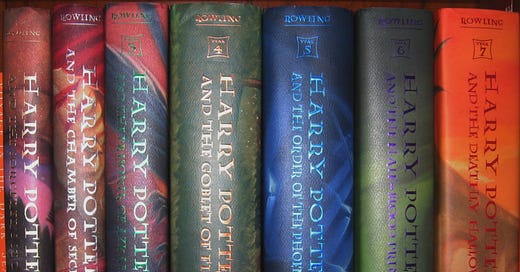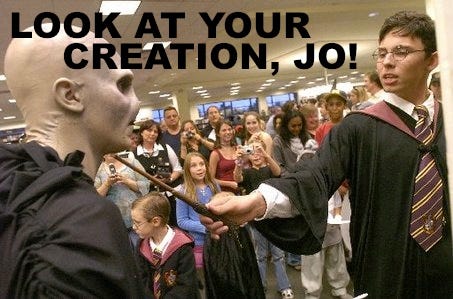For lots of 20-somethings who speak different dialects of English, this summer marks something like the final death blow to our childhood: the official, no-effing-around end of the Harry Potter book and film series. Those unhinged among us will always have their Quidditch matches to attend and Dobby/Aragog slash fiction to write, but for the purposes of CANON -- of JK Rowling's pure, un-besmirched vision -- well, we're done.
(Moment of silence)
The last written page was published four years ago, so it's really just the movies now -- pushed past the financial collapse and Betty White reanimation -- whose ending we come to mourn. But considering how closely the movies have mirrored both the literary evolution of the book series (improving with each new entry) and the none-too-significant "waiting game" that played out between releases, the cut feels somehow deeper. More significant. It's not just the story that's come to an end, but the enveloping Harry Potter experience: ten years of reading, waiting, predicting, discussing, watching, and analyzing that occupied a unique time in a lot of our lives...a time that, let's be real, can't and won't happen again.
1. POTTERHEAD ORIGINS
Revisionist historians will claim that Harry Potter was a cultural force right from the start, in 1998 (or 1997 UK), but that's patently untrue. It was July 2000, when Harry Potter and the Goblet of Fire came out, that the whole thing really blew up. Primed by the boom boom boom release of the first three books as well as the mounting realization that this "children's fiction" series was beginning to tackle some pretty mature subjects (including pervy ghosts), Potter mania had reached fever pitch. If memory serves, Goblet offered the first instance of the series' infamous midnight releases. It was also the first true summer release of the series (while Chamber of Secrets came out in June '99, Potter was still not on many's radar), starting a tradition that would continue straight through to the end. On the page, Harry's stories were feeling less like discrete magical adventures than parts of a larger narrative whole. Readers wanted Harry BAD.
And then, in perhaps his greatest magical feat ever...the bastard vanished for three years. That's a Star Wars movie release cycle! Or a 3/4-finished Olympics waiting period! For kids who had devoured the fourth book in one weekend (with bathroom breaks, don't worry), three years felt something like an eternity. Aside from growing up and making friends, all you could do between July 2000 and June 2003 was WAIT. Some of us -- I won't say who -- were so lost as to re-read the existing Potter books; others may have abandoned the series entirely, aligning themselves early with the "puberty" crowd the rest of us thought were a bunch of jerks. What mattered wasn't the direction you went, but the fact that it was a direction at all -- that Potter was now so big as to be something to react to.
Somehow squeezed in that 00-03 era were also the first two Potter movies, both directed by Chris Columbus, that offered at least some respite from the no-book cold. By "some respite" I mean "they sort of sucked," but even as early as 2002's Chamber of Secrets a few things had already made themselves clear:
1) The art direction was and would likely continue to be pitch-perfect. 2) Unless disfigured in some horrific potions accident, Emma Watson was going to turn into a major babe. 3) If it followed the darkening, maturing trajectory of the books and gave the kids room to grow, this could become a really awesome, and maybe seminal series.
It wasn't until 2004's Prisoner of Azkaban that you really felt like the films could hold a candle to the books, but the fact that they even existed created a new wrinkle in the Potter experience. Suddenly it wasn't just the page and your own mental pictures to consider, but the visions of filmmakers and visual artists, as well. Who'd they cut out? What did they leave in? WHAT DO YOU PEOPLE HAVE AGAINST THE HOGWARTS GHOSTS? And so on.
Thus, against a backdrop of sweaty summer anticipation and chapter-to-scene comparisons (and 9/11, or something) was the "Potterhead" truly born. There's much more to be said about the different taxonomies of Potter fandom, but that's Part Two. We're tired.
NEXT UP (tomorrow, or whenever): The Real Reason We All Care So Goddamn Much About Harry Potter




